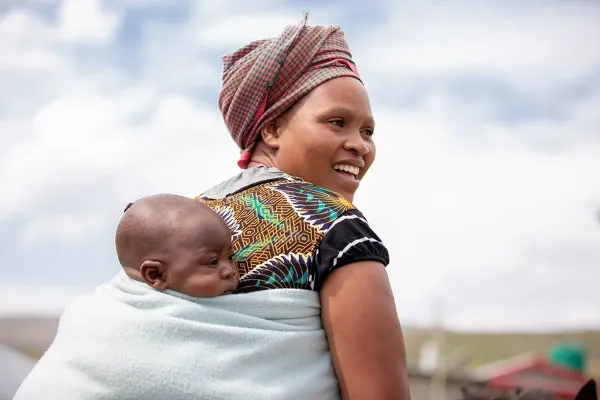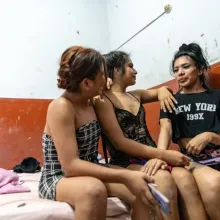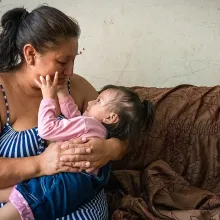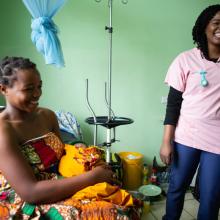Around the world, girls face a choice. It often begins as young as 11 years old.
It’s a choice about their reproductive future, including whether they will one day be a mother.
The stakes are high for girls everywhere, but especially in impoverished communities, where access to reproductive health care is non-existent or limited.
There is much to consider if and when they become mothers, too. Would they have access to quality maternal health care? Safe housing, healthy food, and other essentials? A support system?
All women and girls should have the freedom, education, and resources to make their own decisions about their lives and bodies. But all too often, they don’t. Those who become mothers often lack support on a systemic level.
For more than 30 years, Partners In Health has sought to educate and empower women, girls, and mothers in the countries where we work. It has been our mission to equip women and girls to make their own choices about their reproductive health and, if that choice includes motherhood, to accompany them, whatever it takes.
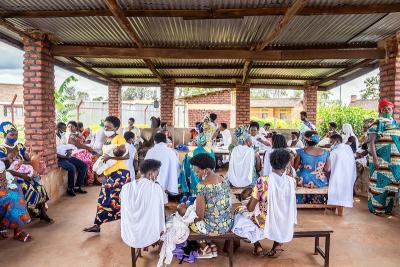
Patients sit in a waiting area for appointments ranging from screening for non-communicable diseases to immunizations for babies.
Photo by Pacifique Mugemana / PIH.
The Choice
As she enters her teen years and young adulthood, a girl has many decisions to make—whether to become sexually active, to stay in school, to get married, to advance her career, to become a mother.
At these crossroads of life, she may also face many influences: peer pressure, societal and family expectations, cultural and religious norms, financial challenges, and sexual and gender-based violence.
Additionally, she may lack access to—or be discouraged from seeking—reproductive health care, such as sex ed, contraception, and family planning services.
These factors can push girls toward motherhood—whether it’s what they envisioned or not.
“We glorify the role of mothers in a family, as caregivers, as the pinnacle of womanhood,” says Marleigh Austin, associate director of gender and youth programming at PIH Canada. “[But] reproductive justice is allowing people to pursue the reproductive pathways that they’d like to.”
Most people worldwide become sexually active around 15 years old. In some cases, that activity starts even younger.
Since these potentially life-altering choices begin early, it is crucial to educate youth, adolescents, and their surrounding communities about family planning, contraception methods, and the risks that an unintended pregnancy could cause to their health, finances, and career and education goals. Communities also need resources and guidance to empower adolescents to pursue multiple paths in life.
“We want to prevent pregnancy in adolescents,” says Natassia Donoho, senior manager of clinical quality and health systems strengthening at PIH. “They are instantly high-risk pregnancies, because they are young, and their bodies are not fully developed.”
Each year, an estimated 12 million girls ages 15 to 19 give birth in low- and middle-income countries, in addition to at least 777,000 girls under 15 years old. At least 50% of the 21 million pregnancies among girls in this age range are unintended. Adolescent mothers face higher risks of eclampsia, puerperal endometriosis, and systemic infections, and their children face increased risk of low-birthweight and prematurity.
In Chiapas, Mexico’s southernmost state and also one of its poorest, teen pregnancy rates are high. To respond to this issue, PIH, known locally as Compañeros En Salud, has hosted workshops to educate youth about family planning and reproductive health.
Similarly, in Malawi and Sierra Leone, PIH has implemented the No Woman or Girl Left Behind project, supported by Global Affairs Canada via PIH Canada. The project aims to strengthen sexual and reproductive health services by delivering medical care, training health workers, and offering education about family planning, as well as by responding to cases of sexual and gender-based violence. PIH provided contraception to 1,105 adolescent girls in Malawi from July 2022 to June 2023.
Worldwide, PIH supports more than 47,000 women each year in starting a family planning method.
These efforts aim to educate youth and to empower them with the resources to make informed decisions about their bodies, lives, and futures. Importantly, these programs emphasize that motherhood, and parenthood in general, should be a choice.
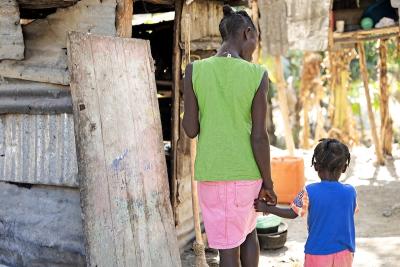
Joléne is the mother of five children, including 3-year-old Raphaël, who was treated for severe malnutrition Cange and Mirebalais, Haiti.
Photo by Melissa Jeanty / PIH.
Supporting Mothers
If and when a woman decides to become a mother, she must have access to quality maternal health care at every stage of pregnancy, from prenatal to postpartum care.
“You have to be able to make the decision to pursue motherhood and then when you do it, the system needs to ensure that you can do it safely,” says Austin.
That process starts with preconception care, helping women understand the health conditions and risk factors that may accompany a pregnancy. For women dealing with infertility, clinicians may prescribe prenatal vitamins and recommend ways to increase the likelihood of conception.
Clinicians then accompany women throughout pregnancy, birth, and postpartum care.
“PIH is ensuring there is a good quality of care given,” says Sister Patricia Efe Azikiwe. “Especially respectful maternity care, where the mothers are respected, their dignity is maintained, [as well as] privacy and confidentiality.”
Azikiwe has been delivering babies, caring for mothers, and training clinicians for decades, from countries ranging from Laos to Bangladesh to South Sudan. Currently with PIH in Sierra Leone—as clinical program manager for reproductive, maternal, newborn, child, and adolescent health—she has worked to strengthen maternal and reproductive health care, including facility-based deliveries and emergency obstetric services.
Historically, Sierra Leonean women give birth at home with traditional birth attendants. While this cultural practice is familiar and comfortable for women and families, it puts them at risk if complications arise—so much so that the Sierra Leonean government banned traditional birth attendants from carrying out deliveries outside of a clinic in 2010.
While respecting cultural norms, PIH set out to transform this practice, in partnership with the local government and community leaders. The PIH team worked to gain the trust of traditional birth attendants and hired them at facilities like Wellbody Clinic, embedding them into clinical practice and the birthing process. Now, traditional birth attendants help connect women with facilities for care, bridging this gap and strengthening maternal care in a country with one of the highest maternal mortality rates in the world.
Globally, PIH supports over 60,000 safe, facility-based deliveries each year, including over 13,000 lifesaving C-sections.
Building trust has been key to PIH’s maternal health work worldwide—trust between mothers and clinicians, between traditional birth attendants and facility-based staff, and between communities and health systems.
“Women will deliver with the one person they trust,” says Daniel Maweu, a nurse-midwife leader with PIH in Malawi. “They will go where there is love, respect, and compassion, and where they feel appreciated and supported.”
In many communities where PIH works, that trusted person is a midwife.
“Midwives are the first and sometimes the only health care worker women meet during their entire pregnancy journey,” says Maweu. “They are the preferred choice of birth attendant for many pregnant women.”
Nurses and midwives account for nearly 50% of the global health workforce. Despite their contributions, midwives are often under-paid and under-resourced—putting mothers, newborns, and maternal health care at risk.
Maweu has been training midwives for years, from Malawi, where he is currently based, to Liberia, where he began working in 2018. He saw the effects of maternal mortality first-hand at J.J. Dossen Hospital in Liberia. From July 2017 to June 2018, Jthe facility saw 600 deliveries ; 15 mothers died.
“That was not acceptable,” Maweu says. “It meant that something needed to be done.”
PIH set out to change the system, earning the trust of the midwives and the community and providing training and mentorship, scholarships for midwifery school, and improvements to staffing, supply chain, and infrastructure at the hospital.
From July 2020 to June 2021, deliveries doubled to 1,200; maternal mortality decreased from 15 to 3.
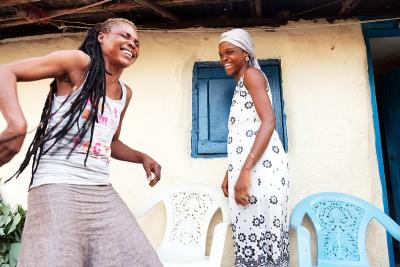
Mariama Kamara (left), now a PIH Sierra Leone employee, was at an Ebola treatment center for almost five weeks, without any form of communication with her daughter, Hawa (right). She has since adopted three children who lost their families in the epidemic.
Photo by Maya Brownstein / PIH.
Supporting Women
Motherhood is one of the life events that women are most celebrated for, due to gender roles and societal expectations.
But the celebration that often accompanies a birth doesn’t always translate to tangible care, support, and respect for mothers in their day-to-day lives.
After birth, as many as 20% of mothers in low- and middle-income countries experience postpartum depression. Mothers and pregnant women risk losing their jobs or experiencing a drop in pay, sometimes called “the motherhood penalty.” Many do not have access to adequate paid parental leave. And mothers disproportionately play the caregiver or homemaker role, taking on the brunt of the domestic labor.
Then there are the women who are often left out of the motherhood narrative: single mothers; women who wanted motherhood, but experienced infertility, miscarriages, or stillbirths; women who were forced to become mothers or have more children than they desired.
To support women and mothers across life stages and circumstances, PIH offers mental health care, including free therapy, screenings, and support groups. Last year, PIH conducted 121,311 mental health patient visits, including for thousands of women and girls.
PIH also provides essential resources, known as social support, such as food, housing, and transportation, recognizing that there is more to health care than medical care. In 2023, PIH distributed 33,317 social support packages to the most vulnerable patients.
For those who become parents, PIH offers education in countries such as Peru—for mothers and fathers.
“The vision at the heart of the gender equality movement is that [caregiving] is not exclusively the purview of women,” says Austin.
In Peru, the CASITA project has enrolled fathers, as well as mothers, to learn caregiving skills. The program emphasizes that caregiving has no gender and that parenting is a task that should be shared. CASITA has enrolled more than 3,648 children since 2013, with 85% showing improvement during its pilot period.For those who become parents, PIH offers education in countries such as Peru—for mothers and fathers.
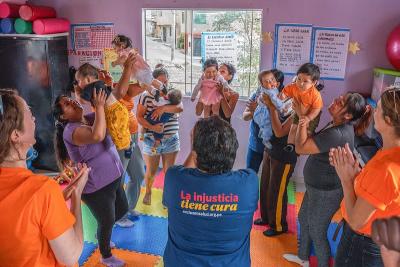
Mothers and their children meet for an educational session hosted by Socios En Salud, as Partners In Health is known in Peru.
Photo by Diego Diaz / PIH.
Themes emerge that run throughout PIH’s maternal and reproductive health work: It is not mothers’ unique responsibility to care for their families and communities; mothers are also owed care and support. Motherhood is also not the only, or the default, choice for women and girls; they should be free to pursue the lives and futures they want.
For Maweu, who has witnessed both the presence, and absence, of maternal and reproductive health services, the need for quality care, everywhere, could not be more urgent.
“Respectful maternity care is non-negotiable,” says Maweu. “As PIH, we work based on the country laws where we are; we do our best to support the reproductive rights of every woman.”
Originally published on pih.org
Support Our Work
Your generous donation today will immediately go towards supporting our dedicated staff in Haiti and the communities we serve.
